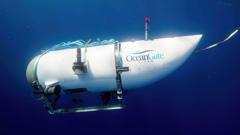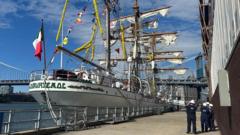The Titan submersible, operated by OceanGate, tragically imploded on its journey to the Titanic wreck due to inadequate engineering and a failure to thoroughly test the vessel, according to a recent report by U.S. officials.
The incident, which occurred in June 2023, resulted in the loss of five lives, including OceanGate’s CEO Stockton Rush.
The U.S. National Transportation Safety Board (NTSB) characterized the engineering process behind Titan as inadequate and highlighted multiple failures that led to a lack of knowledge about the submersible's operational strength and potential damage.
The NTSB's findings suggest that OceanGate failed to recognize critical issues, allowing Titan to continue operations without adequate safety measures in place. This led the vessel to meet neither strength nor durability requirements, positioning it for catastrophic failure during its last voyage.
Prior to its journey, Titan vanished in the North Atlantic while attempting to reach the Titanic wreck site, situated approximately 372 miles from St. John's, Newfoundland and Labrador.
The U.S. Coast Guard acknowledged the preventable nature of the disaster, criticizing OceanGate’s critically flawed safety practices in an earlier report.
Passengers aboard Titan had each paid up to $250,000 for the dive, including renowned deep-sea explorer Paul-Henri Nargeolet and businessman Hamish Harding.
Designed as a 6.7m (22ft) long vessel primarily utilizing carbon fiber with titanium components, Titan was the second version built by OceanGate; the first version was decommissioned after testing. While the submersible’s design was innovative, the investigation pointed to a troubling safety culture within OceanGate, as concerns about design and operational safety were reportedly ignored.
Additionally, a former technician raised alarming statements made by Stockton Rush regarding the possibility of purchasing political influence if regulatory hurdles arose.
In light of the findings, the NTSB has recommended a comprehensive reevaluation of current regulations governing experimental vessels used to transport people, urging the U.S. Coast Guard to consider updated safety standards.
Following the incident, OceanGate has ceased operations, and the future of deep-sea exploration remains in question amid calls for stricter safety protocols.




















